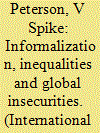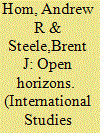|
|
|
Sort Order |
|
|
|
Items / Page
|
|
|
|
|
|
|
| Srl | Item |
| 1 |
ID:
096572


|
|
|
|
|
| Publication |
2010.
|
| Summary/Abstract |
Foreign aid involves a chain of accountability relationships stretching from international donors through national governments and implementing agencies to a set of ultimate end users of the goods and services financed by the aid. In this paper, I review five different accountability relationships that exist in foreign aid projects among donors, governments, implementing agencies and end users. Then I summarize existing empirical evidence demonstrating that foreign aid functions better-both at the macro-level of aid flows and at the micro-level of individual aid projects-when there is more government and implementing agency accountability. Specifying several mechanisms that facilitate accountability, I emphasize that participation is a tool often used to produce accountability within aid projects. However, in terms of donor accountability to aid-receiving countries and the end users in them, recent pushes for increased participation have not resulted in more accountability in the design of aid programs. Ultimately, although enthusiasm for participatory models of aid design and delivery is warranted, participation is not a panacea for all the accountability problems in foreign aid programs.
|
|
|
|
|
|
|
|
|
|
|
|
|
|
|
|
| 2 |
ID:
096573


|
|
|
|
|
| Publication |
2010.
|
| Summary/Abstract |
Global restructuring has dramatically affected the value, extent, and significance of informal economic activities worldwide. Approaching informalization as a systemic phenomenon, this essay illuminates linkages among economic processes, widening inequalities, "governance gaps," and global insecurities. It considers the historical context in which distinctive approaches to informality emerged and reviews three principal "islands" of existing research: mainstream, structuralist, and feminist. These variously illuminate patterns of economic inequality that are central to studies of international political economy. Informality's significance to IR and security studies is further illuminated through a discussion of the processes and political economy of informalization in relation to global migrations, and the interaction of economic and political informalization in the context of "new" wars and security crises.
|
|
|
|
|
|
|
|
|
|
|
|
|
|
|
|
| 3 |
ID:
096578


|
|
|
| 4 |
ID:
096567


|
|
|
|
|
| Publication |
2010.
|
| Summary/Abstract |
The purpose of this review essay is to examine the use of experimental methods and its contributions to international studies research. Following a general discussion of the experimental approach, including the advantages and disadvantages of experimentation in International Relations (IR), this review moves to a categorized discussion of the ways in which experimental methods have contributed to the field of international studies. By invoking economist Alvin Roth's three purposes of experiments-searching for facts, speaking to theorists, and influencing policy debates-this classification scheme helps to identify the overarching purposes of a wide variety of experiments in the field. However, this review seeks to move beyond merely presenting a basic review of the copious experimental literature by also providing an analytical assessment of the function that experimentation serves in IR; that is, to identify and elaborate on experimental research that serves an integrative function, as a bridge across the multiple divides in the landscape of IR. To this end, we introduce a second and original classification framework that allows us to profile in detail a number of singularly significant experimental studies. We then conclude the analysis by highlighting a set of "growth areas" for experimental research that can maintain and expand the already significant contributions of experimental methods to our field.
|
|
|
|
|
|
|
|
|
|
|
|
|
|
|
|
| 5 |
ID:
096569


|
|
|
|
|
| Publication |
2010.
|
| Summary/Abstract |
In the past 10-15 years, an increasing number of revisionist scholars have rejected the most significant elements of the argument about the centrality of the Peace of Westphalia (1648) to the evolution and structure of international society. At the same time, the prominence of this argument has grown in the English School and constructivist international relations scholarship. I deconstruct the function of the Westphalian narrative to explain its pervasiveness and persistence. I argue that it was first developed by nineteenth century imperial international jurists and that the Westphalian narrative perpetuates a Eurocentric bias in international relations theory. This bias maintains that Westphalia created an international society, consolidating a normative divergence between European international relations and the rest of the international system. This dualism is predicated on the assumption that with Westphalia European states had solved the anarchy problem either through cultural or contractual evolution. Non-European states, lacking this European culture and social contract, remained in anarchy until the European states allowed them to join the international society-upon their achievement of the "standards of civilization." This Westphalian narrative distorts the emergence of the modern international system and leads to misdiagnoses of major problems of contemporary international relations. Furthermore, their commitment to the Westphalian narrative prevents international relations scholars from adequately theorizing about international interdependencies and accommodating global pluralism.
|
|
|
|
|
|
|
|
|
|
|
|
|
|
|
|
|
|
|
|
|